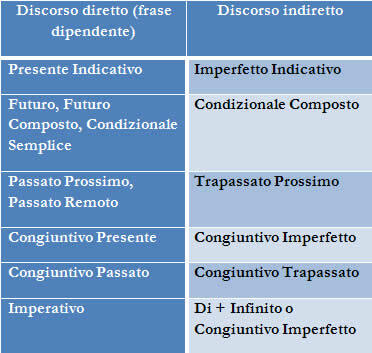Prima di transforming a sentence from direct discourse to indirect speech is bisogno osservare due punti: / Before transforming a sentence from direct to indirect speech, it is necessary to observe two points:
1) If the verb of the main sentence is in the present or in the future / If the verb of the main sentence is in the present or in the future
2) If the verb of the main sentence is in the passage / If the verb of the main sentence is in the past tense
Esempi sul 1st point: / Examples on the first point:
1) Carlo index: «walk to the cinema?” (direct disagreement) / Carlo says:
"- Let's go to the movies"? (direct speech)
2) Carlo index Che vanno al cinema. (indiretto discord) / Carlo says they go to the movies. (indirect speech)
3) Lucia probably will say: «Tutto finirà bene!» (dicorso diretto) / Lucia will probably say:
"- Everything will end well!" (direct speech)
4) Lucia probably will say Che tutto finirà bene. (indiretto discord) / Lucia will probably say that everything will end well. (indirect speech)
5) Le ragazze clamor: «Abbiamo fatto tutti gli esercizi! » (diretto discord) / The girls exclaim:
“- We did all the exercises!” (direct speech)
6) Le ragazze clamor Che hanno fatto tutti gli esercizi. (indiretto disagreement) / The girls exclaim that they have done all the exercises. (indirect speech)
See when the verb of the main sentence is the present or the future (in pink) al dicorso diretto, il tempo del verb nella dipendente (in rosso) non cambia, loose cambia la persona passing from un discorso all’altro. / See that when the verb of the main sentence is in the present or future (in pink) in direct speech, the tense the verb in the dependent sentence (in red) does not change, only changing the person when going from a speech to the other.
Esempi sul 2nd point: / Examples about the 2nd point:
1) Gianlucca ha detto: «Non vowel più stare qui.» (direct disagreement) / Gianlucca said:
"- I don't want to be here anymore." (direct speech)
2) Gianlucca ha detto che non volley più stare there. (indiretto discord) / Gianlucca said he didn't want to be there anymore. (indirect speech)
3) Gianni she laughed: «Non-dirò a solo for Giulia.” (diretto discord) / Gianni replied:
"- I won't say a single word to Giulia." (direct speech)
4) Gianni has responded che non avrebbe detto a solo for Giulia. (indiretto discord) / Gianni replied that he would not say a single word to Giulia. (indirect speech)
5) Lucia said: «ho bought dei nuovi pantaloni» (direct discord) / Lucia had said:
"- I bought new pants." (direct speech)
6) Lucia said che she aveva shop I gave nuovi pantaloni. (indiretto discord) / Lucia had said that she had bought new pants. (indirect speech)
See when the verb of the main sentence is the passage (in blu) al discorso diretto, cambia il tense verbale (in green) ed anche la persona when one speaks the transformazione da un discorso altro. / Note that when the verb of the main sentence is in the past tense (in blue) in direct speech, the verb tense (in green) and also the person changes when transforming from one speech to another.
Osserva sotto the list I change from the direct discourse all’indiretto when the verb of the main sentence is al passato. / Note the list of changes below when the verb of the main sentence (direct speech) is in the past tense.

Attention! / Heads up!
If you have seen a po’ di più sull’argoment indirect discourse vedi i following testi al site: “I cambi dei modi i tempi verbali dal discorso diretto all’indiretto.”, “Capendo il discourso indirect.”, “Contrast tra i discorsi: diretto and indiretto.” / If you want to understand a little more about indirect speech, see the following texts on the website: “I cambi dei modi i tempi verbali dal discorso diretto all’indiretto.”, “Capendo il discorso indiretto.”, “Contrasto tra i discorsi: diretto e indirect.”
Isabela Reis de Paula
Brazil School Collaborator
Graduated in Languages with Qualification in Portuguese and Italian
By the Federal University of Rio de Janeiro - UFRJ
Source: Brazil School - https://brasilescola.uol.com.br/italiano/alcuni-dettagli-sul-discorso-indiretto.htm
